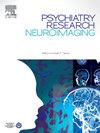重度抑郁症患者反刍相关网络的结构变化
IF 2.1
4区 医学
Q3 CLINICAL NEUROLOGY
引用次数: 0
摘要
反刍是重度抑郁症(MDD)的一种常见症状。以往的研究已将反刍的个体差异与不同脑区的结构特性联系起来。其中一些区域,如背外侧前额叶皮层(dlPFC),也被强调为在 MDD 中发生了改变,这表明结构变化与反刍症状之间存在联系。这种局部关系虽然具有参考价值,但从大脑网络的角度来看却有其局限性。为了进一步研究抑郁症中与反刍相关的结构变化,并将这些变化置于潜在的功能网络中,我们获取了 MDD 患者(32 人)和对照组(69 人)的 T1 加权结构 MRI 数据。反刍采用反刍反应量表进行测量。对皮质灰质进行了基于表面的全脑分析,发现了dlPFC的群体差异,但这些差异与反刍无关。相反,反刍与右侧楔前区的灰质特性相关。通过对独立样本(n = 100)进行规范功能连接分析,我们发现这两个区域是相互关联的。从网络的角度进一步发展,我们发现与反刍相关的楔前区与执行功能、自传体记忆和视觉感知等过程相关的网络相连。值得注意的是,这些过程都与反刍有关。这些结果表明,抑郁症患者的反刍可能与病灶结构变化有关。这些病灶变化对反刍的影响可能与它们对分布式功能网络的影响有关。本文章由计算机程序翻译,如有差异,请以英文原文为准。
Structural alterations in a rumination-related network in patients with major depressive disorder
Rumination is a common symptom in major depressive disorder (MDD). Previous work has connected individual differences in rumination to structural properties in various brain regions. Some of these, such as the dorsolateral prefrontal cortex (dlPFC), have also been highlighted as being altered in MDD, suggesting a connection between structural changes and ruminative symptoms. Although informative, such localised relations have limitations in the context of a network view of the brain. To further investigate rumination-related structural changes in depression, and to situate these within potential functional networks, we acquired T1-weighted structural MRI data from patients with MDD (n = 32) and controls (n = 69). Rumination was measured with the Rumination Response Scale. Surface-based, whole-brain analysis of cortical grey-matter identified group differences in the dlPFC that were, however, not related to rumination. Instead, rumination was correlated with grey-matter properties in the right precuneus. Using normative functional connectivity analysis on an independent sample (n = 100), we show these two regions to be interconnected. Further developing a network-based perspective, it was shown that the rumination-related precuneus region is connected with networks associated with processes such as executive function, autobiographical memory, and visual perception. Notably, these processes have been connected to rumination. These results suggest that rumination in depression may be linked to focal structural changes. The effects of these focal changes on rumination may then be connected to their influence on distributed functional networks.
求助全文
通过发布文献求助,成功后即可免费获取论文全文。
去求助
来源期刊
CiteScore
3.80
自引率
0.00%
发文量
86
审稿时长
22.5 weeks
期刊介绍:
The Neuroimaging section of Psychiatry Research publishes manuscripts on positron emission tomography, magnetic resonance imaging, computerized electroencephalographic topography, regional cerebral blood flow, computed tomography, magnetoencephalography, autoradiography, post-mortem regional analyses, and other imaging techniques. Reports concerning results in psychiatric disorders, dementias, and the effects of behaviorial tasks and pharmacological treatments are featured. We also invite manuscripts on the methods of obtaining images and computer processing of the images themselves. Selected case reports are also published.

 求助内容:
求助内容: 应助结果提醒方式:
应助结果提醒方式:


